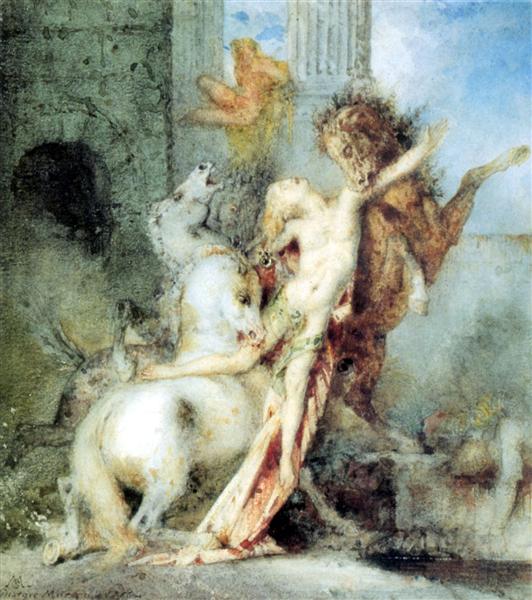Description
In the dense and dark atmosphere of the 19th century symbolism, the figure of Gustave Moreau is erected as a lighthouse of narrative complexity and bold pictorial imagination. One of the most evocative examples of his work is his painting "Diomedes devoured by his horses" of 1866, a piece that displays a multifaceted face of classical mythology with an intensity and meticulousness characteristically Moreaunian.
"Diomedes devoured by his horses" captures a moment of brutal recollection and overwhelming drama. The canvas shows a scene of the Greek mythology that describes the punishment of King Trio Diomedes, who, according to legend, was condemned to be devoured by his own carnivorous horses as punishment for his cruelty. Moreau, known for his inclination towards mythological and biblical themes, presents this scene with a disturbing majesty.
Observing compositional aspects, the painting focuses on the figure of Diomedes, lying on a gesture of surrender and suffering. His half -naked, stylized and delicately detailed body contrasts vividly with the excessive ferocity of the horses that attack him. The horses, in possess of violence and movement, seem almost human in their expression of fury and in their detailed muscles, which adds a layer of monstrosity and deformity that is characteristically Moreauniana.
The colors that Moreau chooses in this painting are equally expressive and suggestive. The dark and terrible tones predominate, which create a gloomy and dark atmosphere, accentuated by flashes of light that fall on the pale skin of diomedes and the golden and white details that dot the crines of the horses and broken armor. This restricted palette not only intensifies the drama of the scene, but also reflects the influence of masters Baroque and Renaissance, whose works Moreau studied and admired deeply.
In terms of symbolism and meaning, painting is a reflection on divine justice and the remuneration of evil. The cruelty of Diomedes, who fed his horses with human flesh, turns against him in an incarnate representation of the Karmic punishment. Moreau, through this gloomy and detailed visual narration, not only captures the tragedy of King Trio, but also invites the viewer to meditate on morality and consequences of human acts.
"Diomedes devoured by his horses" is undoubtedly a masterpiece that encapsulates the wealth of symbolism and psycho -emotional depth that characterizes Gustave Moreau's work. Its ability to imbute mythological scenes with an intensely emotional realism and a disturbing beauty positions this painting as an essential piece both in the study of the art of the nineteenth century and in the canon of mythological iconography. In it, Moreau offers us not only a window to the mythical past, but also a mirror of our own moral and existential realities.
KUADROS ©, a famous paint on your wall.
Hand-made oil painting reproductions, with the quality of professional artists and the distinctive seal of KUADROS ©.
Art reproduction service with satisfaction guarantee. If you are not completely satisfied with the replica of your painting, we refund your money 100%.

